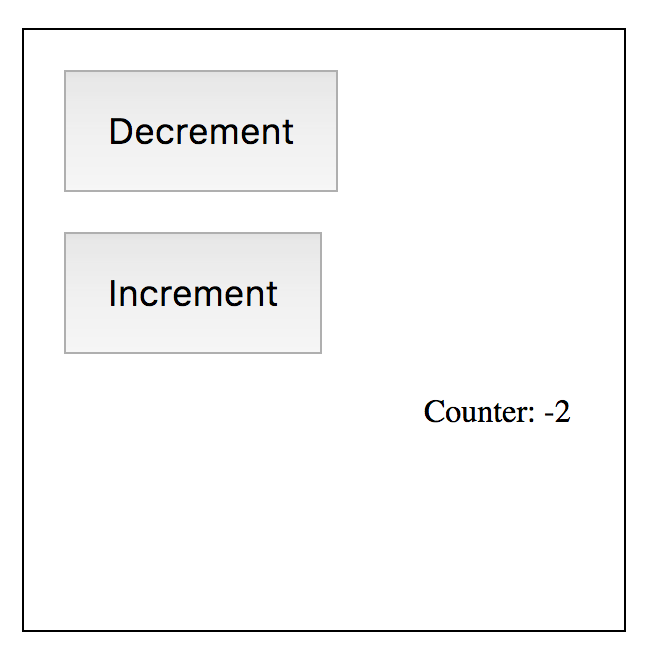Practical universal apps
in
functional JavaScript

Øredev 2017
Dr Gleb Bahmutov PhD
C / C++ / C# / Java / CoffeeScript / JavaScript / Node / Angular / Vue / Cycle.js / functional
JavaScript ninja, image processing expert, software quality fanatic
VP of Eng at

Testing, the way it should be

Code always grows
more complex
Company lifetime
Number of engineers
How do you write a complex application?
A: Write complex code
B: Assemble simple pieces
Complex code
-
Giant singletons
-
Code is hard to test
-
Code is hard to reuse
Let us write safe, elegant and powerful code
Talk Outline
-
Simple problem
-
Testability, side effects, purity
-
Imperative vs Declarative
-
Functional reactive console app
-
Functional reactive web app
Listen, glance at code
Get the most from this talk
Get the slides
Read the code
Example problem
var numbers = [3, 1, 7]
var constant = 2
// 6 2 14given an array of numbers, multiply each number by a constant and print the result.
var numbers = [3, 1, 7]
var constant = 2
for (var k = 0; k < numbers.length; k += 1) {
console.log(numbers[k] * constant)
}
// 6
// 2
// 14Imperative code
var numbers = [3, 1, 7]
var constant = 2
for (var k = 0; k < numbers.length; k += 1) {
console.log(numbers[k] * constant)
}
console.log('k =', k)
// 6
// 2
// 14
// k = 3Always something unexpected
var numbers = [3, 1, 7]
var constant = 2
for (let k = 0; k < numbers.length; k += 1) {
console.log(numbers[k] * constant)
}
console.log('k =', k)
// console.log('k =', k)
// ^
// ReferenceError: k is not definedES6 "let" 👍
var numbers = [3, 1, 7]
var constant = 2
for (let k = 0; k < numbers.length; k += 1) {
console.log(numbers[k] * constant)
constant = 10
}
// 6
// 10
// 70Source code should reflect what really happens
var numbers = [3, 1, 7]
const constant = 2
for (let k = 0; k < numbers.length; k += 1) {
console.log(numbers[k] * constant)
constant = 10
}
// 6
// index.js:13
// constant = 10
// ^
// TypeError: Assignment to constant variable.ES6 "const" 👍
standard --verbose --fix 'src/**/*.js'
standard: Use JavaScript Standard Style
(https://standardjs.com)
index.js:13:3:
'constant' is constant. (no-const-assign)Static code linting 👍
const numbers = [3, 1, 7]
const constant = 2
for (let k = 0; k < numbers.length; k += 1) {
console.log(numbers[k] * constant)
}Let's make "numbers" constant too
const numbers = [3, 1, 7]
const constant = 2
numbers[0] = 100
for (let k = 0; k < numbers.length; k += 1) {
console.log(numbers[k] * constant)
}
// 200
// 2
// 14JavaScript "const" is a liar

const X = Y
X cannot point at anything else but Y
const immutable = require('seamless-immutable')
const numbers = immutable([3, 1, 7])
const constant = 2
numbers[0] = 100
// index.js:4
// numbers[0] = 100
// ^
// TypeError: Cannot assign to read only
// property '0' of object '[object Array]'JavaScript 3rd party libraries are awesome
const immutable = require('seamless-immutable')
const numbers = immutable([3, 1, 7])
const constant = 2
for (let k = 0; k < numbers.length; k += 1) {
console.log(numbers[k] * constant)
}Finally, imperative code that means what is says, and says what it means
Testing
it('prints numbers', () => {
const sinon = require('sinon')
sinon.spy(console, 'log')
require('./index.js')
console.assert(console.log.calledWith(6), 'printed 6')
console.assert(console.log.calledWith(2), 'printed 2')
console.assert(console.log.calledWith(14), 'printed 14')
})mocha src/**/*spec.js
6
2
14
✓ prints numbers (154ms)
1 passing (163ms)it('prints numbers', () => {
const sinon = require('sinon')
sinon.spy(console, 'log')
require('./index.js')
console.assert(console.log.calledWith(6), 'printed 6')
console.assert(console.log.calledWith(2), 'printed 2')
console.assert(console.log.calledWith(14), 'printed 14')
})
it('does nothing', () => {
console.assert(console.log.calledWith(6), 'printed 6')
console.assert(console.log.calledWith(2), 'printed 2')
console.assert(console.log.calledWith(14), 'printed 14')
})mocha src/**/*spec.js
6
2
14
✓ prints numbers (178ms)
✓ does nothing
2 passing (187ms)Tests lie
it.only('does nothing', () => {
console.assert(console.log.calledWith(6), 'printed 6')
console.assert(console.log.calledWith(2), 'printed 2')
console.assert(console.log.calledWith(14), 'printed 14')
})mocha src/**/*spec.js
1) does nothing
0 passing (11ms)
1 failing
1) does nothing:
TypeError: console.log.calledWith is not a function
at Context.it.only (spec.js:12:30)Tests are brittle
const sinon = require('sinon')
beforeEach(() => {
sinon.spy(console, 'log')
})
afterEach(() => {
console.log.restore()
})
it('prints numbers', () => {
require('./index.js')
console.assert(console.log.calledWith(6), 'printed 6')
console.assert(console.log.calledWith(2), 'printed 2')
console.assert(console.log.calledWith(14), 'printed 14')
})Reset spies
require is a problem
require('./index.js')
-
Loads source from "index.js"
-
Evaluates the source
-
Puts result into "require.cache"
require('./index.js')6
2
14require('./index.js')
cache['./index.js'] =// unchangedcache = {}require('./index.js')6
2
14require('./index.js')
cache['./index.js'] =cache['./index.js'] =cache = {}Side effects
const immutable = require('seamless-immutable')
function multiplyAndPrint () {
const numbers = immutable([3, 1, 7])
const constant = 2
for (let k = 0; k < numbers.length; k += 1) {
console.log(numbers[k] * constant)
}
}
module.exports = multiplyAndPrintDefer execution
const multiplyThenPrint = require('./index')
it('prints numbers', () => {
multiplyThenPrint()
console.assert(console.log.calledWith(6), 'printed 6')
console.assert(console.log.calledWith(2), 'printed 2')
console.assert(console.log.calledWith(14), 'printed 14')
})
it('prints numbers again', () => {
multiplyThenPrint()
console.assert(console.log.calledWith(6), 'printed 6')
console.assert(console.log.calledWith(2), 'printed 2')
console.assert(console.log.calledWith(14), 'printed 14')
})6
2
146
2
14prints numbers
prints numbers
again
function multiplyAndPrint () {
const numbers = immutable([3, 1, 7])
const constant = 2
for (let k = 0; k < numbers.length; k += 1) {
console.log(numbers[k] * constant)
}
}
module.exports = multiplyAndPrintSide effect
Testing this code
Mocking this code
Mocking smell
multiply
console.log
function multiplyAndPrint (cb) {
const numbers = immutable([3, 1, 7])
const constant = 2
for (let k = 0; k < numbers.length; k += 1) {
cb(numbers[k] * constant)
}
}
module.exports = multiplyAndPrintmodule.exports = multiplyAndPrint
if (!module.parent) {
// "app"
multiplyAndPrint(console.log)
}const sinon = require('sinon')
const multiplyThenPrint = require('./index')
it('produces numbers', () => {
const cb = sinon.spy()
multiplyThenPrint(cb)
console.assert(cb.calledWith(6), 'produced 6')
console.assert(cb.calledWith(2), 'produced 2')
console.assert(cb.calledWith(14), 'produced 14')
})Mocking ➡ Passing arguments
Improve Testability
function multiplyAndPrint (cb) {
const numbers = immutable([3, 1, 7])
const constant = 2
for (let k = 0; k < numbers.length; k += 1) {
cb(numbers[k] * constant)
}
}
module.exports = multiplyAndPrintmultiplyAndPrint is testable, but still produces a side effect
const T = () => true
const I = (x) => xpure functions
setTimeout(...)
new Promise(...)
window.location = ...not pure
const HelloWorld = ({name}) => {
return (
<div>Hello {name}</div>
)
}pure function
$el.innerHTML = ...not pure
const h = require('virtual-dom/h')
const render = ({name}) =>
h('div', {}, [`Hello ${name}`])pure function
function main (console) {
return function inner () {
console.log('Hello')
}
}
const app = main(console)
app()Note: a pure function can return impure function
pure
impure
impure
pure
defer execution!
require executes code ➡ export a function
log ➡ return a function that logs
Setup a function that will do side effect
But let someone else call it
Talk Outline
-
Simple problem
-
Testability, side effects, purity
-
Imperative vs Declarative
-
Functional reactive console app
-
Functional reactive web app
Imperative vs Declarative
function multiplyAndPrint (cb) {
const numbers = immutable([3, 1, 7])
const constant = 2
for (let k = 0; k < numbers.length; k += 1) {
cb(numbers[k] * constant)
}
}function multiplyAndPrint (cb) {
const numbers = immutable([3, 1, 7])
const constant = 2
const byConstant = x => x * constant
const log = x => cb(x)
numbers.map(byConstant).forEach(log)
}imperative
declarative
Elegant, simple,
easy to read code
numbers.map(byConstant).forEach(log)Curried functions
const mul = x => y => x * y
const constant = 2
const byConstant = mul(constant)
// byConstant = y => constant * y
[1, 2, 3].map(byConstant)
// [2, 4, 6]
const {multiply, unary} = require('ramda')
function multiplyAndPrint (cb) {
const numbers = immutable([3, 1, 7])
const constant = 2
const byConstant = multiply(constant)
const log = unary(cb)
numbers.map(byConstant).forEach(log)
}
module.exports = multiplyAndPrintJavaScript 3rd party libraries are awesome
function multiplyAndPrint (K, numbers, cb) {
const byConstant = multiply(K)
const log = unary(cb)
numbers.map(byConstant).forEach(log)
}if (!module.parent) {
const numbers = immutable([3, 1, 7])
multiplyAndPrint(2, numbers, console.log)
}Use Inputs
const numbers = immutable([3, 1, 7])
multiplyBy(2, numbers)
.forEach(unary(console.log))Finally, pure "multiplyBy"
function multiplyBy (K, numbers) {
const byConstant = multiply(K)
return numbers.map(byConstant)
}impure
Inputs ➡ Output
const numbers = immutable([3, 1, 7])
multiplyBy(2, numbers)
.forEach(unary(console.log))Can we make this logic pure?
function main () {
const numbers = immutable([3, 1, 7])
multiplyBy(2, numbers)
.forEach(unary(console.log))
}
main()Can we make this logic pure?
function main (print) {
const constant = 2
const numbers = immutable([3, 1, 7])
return function dirty () {
multiplyBy(constant, numbers).forEach(print)
}
}
const app = main(unary(console.log))
app()Return function to do dirty work
impure
pure
Push side-effects away from the core
Pushing side-effects in ServiceWorkers
Gleb Bahmutov
The future belongs to you (and your JavaScript)
Friday, 14.20 Room: Homo Agitatus
Talk Outline
-
Simple problem
-
Testability, side effects, purity
-
Imperative vs Declarative
-
Functional reactive console app
-
Functional reactive web app
Going beyond arrays
const numbers = [3, 1, 7]
multiplyBy(2, numbers)
.forEach(unary(console.log))
// 3
// 1
// 7
numbers.push(100)nothing happens
Reactive streams
Arrays with superpowers
Reactive streams
const Rx = require('rxjs/Rx')
function main (print) {
const constant = 2
const numbers = Rx.Observable.of(3, 1, 7)
return function dirty () {
multiplyBy(constant, numbers).forEach(print)
}
}
main(console.log)()6
2
14prints multiplied numbers
Reactive streams
const Rx = require('rxjs/Rx')
function main (print) {
const constant = 2
const numbers = Rx.Observable.interval(1000)
return function dirty () {
multiplyBy(constant, numbers).forEach(print)
}
}
main(console.log)()0
2
4
6
...prints multiplied seconds
function main (print) {
const constant = 2
const numbers = Rx.Observable.of(3, 1, 7)
return function dirty () {
const seconds = Rx.Observable.interval(1000)
const numberPerSecond = Rx.Observable.zip(
numbers,
seconds,
(number, seconds) => number
)
multiplyBy(constant, numberPerSecond)
.forEach(print)
}
}6
2
14prints a multiplied number
every second
// numbers -3-1-7-|------------->
// seconds -0---1---2---3---4--->
// zip: (number, second) => number
// num/sec -3---1---7-|--------->
// map: x => 2 * x
// result -6---2---14-|-->6
2
14Marble diagrams
prints a multiplied number
every second
function main (print) {
const constant = 2
const numbers = Rx.Observable.of(3, 1, 7)
const seconds = Rx.Observable.interval(1000)
const numberPerSecond = Rx.Observable.zip(
numbers,
seconds,
(number, seconds) => number
)
return function dirty () {
multiplyBy(constant, numberPerSecond)
.forEach(print)
}
}impure
pure
Creates stream "subscription"
Starts event flow
function main (print) {
const constant = 2
const numbers = Rx.Observable.of(3, 1, 7)
const seconds = Rx.Observable.interval(1000)
const numberPerSecond = Rx.Observable.zip(
numbers,
seconds,
(number, seconds) => number
)
return function dirty () {
multiplyBy(constant, numberPerSecond)
.subscribe(print)
}
}pure
Creates stream "subscription"
Starts event flow
impure

When you connect pipe system, it is all clean.
It only gets dirty after the first flush.
function main () {
const constant = 2
const numbers = Rx.Observable.of(3, 1, 7)
const seconds = Rx.Observable.interval(1000)
const numberPerSecond = Rx.Observable.zip(
numbers,
seconds,
(number, seconds) => number
)
return multiplyBy(constant, numberPerSecond)
}
main().subscribe(console.log)pure
impure
In reactive program, we don't need to return a second function to push out side effects. Just return a cold Observable
Defer execution
function main (print) {
return function dirty () {
print()
}
}
const app = main(console.log)
app()function main () {
return Observable...
.map(...)
.filter(...)
.zip(...)
}
const app = main()
app.subscribe(console.log)pure
impure
pure
impure
it('multiplies numbers', done => {
this.timeout(2500)
const app = main()
const numbers = []
app.subscribe(x => numbers.push(x), null, () => {
console.assert(equals(numbers, [6, 2, 14]))
done()
})
})direct side effect into the test result
Testability
it('tests second number', done => {
main()
.skip(1)
.take(1)
.subscribe(x => console.assert(x === 2), null, done)
})test second number
lazy-evaluate
Testability
Reactive Console App
const readline = require('readline')
readline.emitKeypressEvents(process.stdin)
if (process.stdin.isTTY) {
process.stdin.setRawMode(true)
}
function getKeys () {
const key$ = Rx.Observable.fromEvent(
process.stdin, 'keypress')
const enter$ = key$.filter(s => s === '\r')
return key$.takeUntil(enter$)
}stream of keyboard presses
Reactive Console App
const constant = 2
const key$ = getKeys()
const app = main(constant, key$.map(Number))
app.subscribe(console.log, null, () => {
console.log('done with keys')
process.exit(0)
})multiplies user numbers
We pushed input and output streams outside of "main" function
Reactive Web App
User
main
server
Synchronize
everything
vs
Concurrent
events
Reactive Web App
const h = require('virtual-dom/h')
const constant = 2
const numbers$ =
Rx.Observable.fromEvent($input, 'input')
.map(event => event.target.value)
const app = main(constant, numbers$)
.map(x => h('div', {}, [x]))
app.subscribe(vdom => {
patchDOM(vdom)
})stream of values from DOM
stream of output virtual doms
Reactive: your code only reacts to events
You never command anyone.
no .setState, no db.update, no view.render()
Functional: functions are building blocks
no this, no new, no class
Cycle.js
A functional and reactive JavaScript framework for predictable code

Cycle.js
function main({DOM}) {
const decrement$ = DOM
.select('.decrement').events('click')
.map(ev => -1)
const increment$ = DOM
.select('.increment').events('click')
.map(ev => +1)
...Decrement
-1
-1
-1
-1
Increment
1
1
1
intent
Cycle.js
function main({DOM}) {
...
const action$ =
Observable.merge(decrement$, increment$)
const count$ =
action$.startWith(0).scan((x,y) => x+y)-1
-1
-1
-1
1
1
1
-1
-1
-2
-1
0
-1
0
0
model
action$
count$
Cycle.js
function main({DOM}) {
...
const vtree$ = count$.map(count =>
div([
button('.decrement', 'Decrement'),
button('.increment', 'Increment'),
p('Counter: ' + count)
])
)
return { DOM: vtree$ }
}view
Cycle.js
Cycle.run(main, {
DOM: CycleDOM.makeDOMDriver('#app')
})See in action at glebbahmutov.com/draw-cycle/
start app from main
Pass Observables everywhere
Virtual DOM
HTTP requests / responses
Route changes
State updates
Parent / child components
Cycle.js on the server
server.use(function (req, res) {
run(main, {
DOM: makeHTMLDriver(html => res.send(html))
})
})
server.listen(process.env.PORT)Isolated rendering ➡ simple to render into HTML and send to the client
Universal
Why Cycle.js is Hard
You must plan your app's entire event flow at once
Conclusions
Move side effects away from logic
Defer execution
- return impure function for someone else to call
- return Observable for someone else to start
Conclusions
Build reactive functional apps
- Use Observables as arguments / return value
- Process events in the pipeline using small simple callbacks
Check out Cycle.js
Thank You 👏 Øredev
slides.com/bahmutov/fp-apps
mention @bahmutov

when it comes out ...
bahmutov.com
everyone